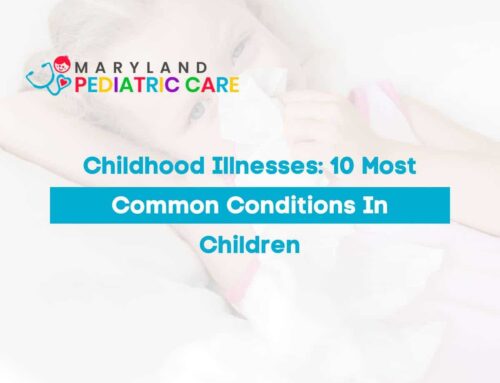How To Keep Your Baby Hydrated When They’re Sick
What To Do When Your Baby Gets Sick
One of the most important things you can do for your baby when they’re ill is to ensure they stay hydrated. This is especially important if their illness involves a fever or if they have been vomiting or having diarrhea. You must also reassure your infant that everything will be okay!
That is easier said than done, of course, but some recommendations work. A reliable Boyds pediatrician will mention them below so you can keep your baby hydrated and in stable condition during that difficult situation.

Tips For Babies 0-6 months
Babies only consume breast milk, formula, or a combination of the two at this age. Water is not recommended until six months since their kidneys are still too undeveloped to handle it.
If your infant continues to drink their usual amount of milk, that’s fantastic! They frequently require smaller, more frequent feedings, though. Sometimes just 0.5–1 oz at a time is enough for their delicate stomachs if they are vomiting. The “5 every 5” method is great for babies who just cannot seem to keep anything down.
This is how to follow the method:
- Fill a 5ml syringe with milk and slowly inject it into their mouth (aim for where their bottom molars will be one day, instead of straight back), as if you were administering medication.
- Wait five minutes, then repeat.
- Repeat!
- Take a break after 1 oz (6 syringes) wait 20–30 minutes, and then repeat.
Although it would take a lot of work and time, it works. It’s a recommendation that can work before calling a Damascus pediatrician.
With these little amounts, even the most delicate stomachs have time to absorb the drink. If they vomit, it will only be liquid from their stomach, and they will still have digested the milk.
And keep in mind that if they do vomit, it always appears worse than it is. If you don’t believe me, spill a tablespoon of water on your countertop to see what it looks like: a small amount of liquid appears to be much greater than it is.
Other methods for receiving fluids in:
- Fill little popsicle molds with breast milk or formula and let them suck on them.
- If your infant refuses to drink milk, you can give them an electrolyte solution such as Pedialyte. Kinderlyte is a substitute for this that is free of artificial flavors, colors, and sweeteners. You can also use popsicle molds to freeze it.
If your baby has started meals and is still interested in them, some nutritious options with a high water content are:
- Apple sauce
- Pureed fruits and vegetables, particularly melon, berries, carrots, and peas.
Don’t forget to always use undiluted formula or breast milk. If you still have doubts, talk to your trusted Gaithersburg pediatrician.
Tips For Babies 6-12 months
At this age, children are normally consuming more solid foods regularly. However, much like us, their appetite for solid foods can suffer when they are ill.
Stay calm! Yes, they could skip meals and even lose a little weight for a few days, but once they start feeling better, they will change that.
Since hydration is our goal, you can keep your baby well-hydrated with the following:
- Watermelon (in little pieces)
- Mangoes
- Any fruit purees, such as apple sauce
- Frozen popsicles with formula or breastmilk
If you’re going to give food to a baby, start with blander options like plain crackers, oatmeal combined with breastmilk or formula, and toast sliced into 1″ wide pieces with butter or thinly spread nut or seed butter.
The same rule that applies to fluids also applies to food: start with a tiny bit, give them a rest, then offer more if they seem hungry.
Babies can still drink water at this age, but it’s a good idea to offer them fluids that include electrolytes.
Don’t forget to keep an eye on your baby. If you think you need help, contact a Germantown pediatrician.
Tips For Babies & Toddlers (1-year-old & More)
Your child will be transitioning away from breast milk and/or formula by this age. They might have started consuming milk made from plants or cows. They might have stopped consuming all milk completely! Their nutrition will change, and they’ll likely consume three substantial meals and possibly two or three snacks every day.
When they are ill, water is crucial, just like in younger age groups. They can drink water, electrolyte solutions, or diluted fruit juice (use half fruit juice and half water).
All food alternatives are available, but as with earlier ages, choose fruits with greater water content and bland solid foods. If your child tolerates them well and still appears to be hungry, you can introduce other meal foods while feeding them tiny portions.
Contact a Maryland Pediatrician For More Help
Note that this list is not all-inclusive and that these factors apply to babies of all ages. Never be afraid to call your doctor if you have concerns about your child.
At Maryland Pediatric Care, we can help you with any issue you have with your baby, including dehydration. Feel free to contact us so we can help!

Maryland Pediatric Care
19525 Doctors Drive,
Germantown, MD 20874
Phone: 301-424-2400
Email: [email protected]
Mon, Tue, Thu, Fri: 8:00am – 5:00pm
Wednesday: 8:00am – 1:00pm
Every second Saturday of month
(9:00am – 11:30Am)





